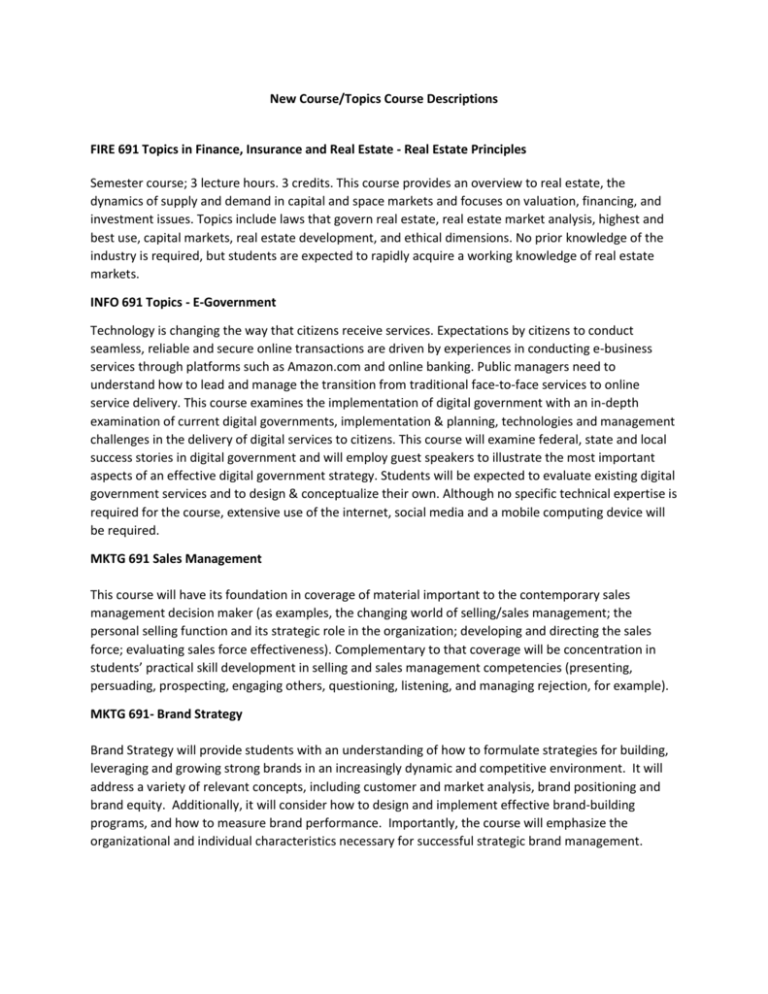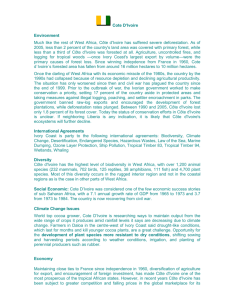New Course/Topics Course Descriptions FIRE 691 Topics in
advertisement

New Course/Topics Course Descriptions FIRE 691 Topics in Finance, Insurance and Real Estate - Real Estate Principles Semester course; 3 lecture hours. 3 credits. This course provides an overview to real estate, the dynamics of supply and demand in capital and space markets and focuses on valuation, financing, and investment issues. Topics include laws that govern real estate, real estate market analysis, highest and best use, capital markets, real estate development, and ethical dimensions. No prior knowledge of the industry is required, but students are expected to rapidly acquire a working knowledge of real estate markets. INFO 691 Topics - E-Government Technology is changing the way that citizens receive services. Expectations by citizens to conduct seamless, reliable and secure online transactions are driven by experiences in conducting e-business services through platforms such as Amazon.com and online banking. Public managers need to understand how to lead and manage the transition from traditional face-to-face services to online service delivery. This course examines the implementation of digital government with an in-depth examination of current digital governments, implementation & planning, technologies and management challenges in the delivery of digital services to citizens. This course will examine federal, state and local success stories in digital government and will employ guest speakers to illustrate the most important aspects of an effective digital government strategy. Students will be expected to evaluate existing digital government services and to design & conceptualize their own. Although no specific technical expertise is required for the course, extensive use of the internet, social media and a mobile computing device will be required. MKTG 691 Sales Management This course will have its foundation in coverage of material important to the contemporary sales management decision maker (as examples, the changing world of selling/sales management; the personal selling function and its strategic role in the organization; developing and directing the sales force; evaluating sales force effectiveness). Complementary to that coverage will be concentration in students’ practical skill development in selling and sales management competencies (presenting, persuading, prospecting, engaging others, questioning, listening, and managing rejection, for example). MKTG 691- Brand Strategy Brand Strategy will provide students with an understanding of how to formulate strategies for building, leveraging and growing strong brands in an increasingly dynamic and competitive environment. It will address a variety of relevant concepts, including customer and market analysis, brand positioning and brand equity. Additionally, it will consider how to design and implement effective brand-building programs, and how to measure brand performance. Importantly, the course will emphasize the organizational and individual characteristics necessary for successful strategic brand management. ECON 691 Environmental and Natural Resource Economics This course introduces theory and tools (economic and policy analysis) to examine management of a wide range of problems related to environmental quality and natural resources for public and private sectors on local and international scales. This course introduces economic principles, reasoning, tools and empirical applications of theories to environmental policy arising from the study of markets and market failures (externalities, information asymmetry, public goods, etc). Economic incentives for the public and private sectors in environmental regulation are modeled and evaluated for policies implemented at local and international scales. The range of natural resources includes energy, water, fishery, forestry, biodiversity in the exploration of economic theory and analysis for policy and management. Many empirical examples focus on natural resource scarcity and conservation over time and environmental quality protection. Policy instruments to analyze through environmental and resource economics include (tradable permits, taxes, liability rules, deposit-refund systems, voluntary compliance incentives, information mechanisms, standards, etc). INFO 691- Analytics Business Case This course provides a unique opportunity to collaborate with CIOs of top Commonwealth Departments. Under the joint sponsorship of the Commonwealth’s Secretary of Technology and CIO, pairs of students will evaluate data-centric means of improving operational effectiveness and recommend specific approaches (including estimated savings). In this manner, participants will gain deep understanding of the important concepts and techniques using data to drive reengineering as well as practical experience in the development of a data-centric systems. Participating Commonwealth CIOs will finish the semester with a solid business case (with concrete examples) for implementing datacentric practices in their organizations. Background: Virginia technology secretary, CIO join forces with VCU to explore data centric initiatives Virginia’s secretary of technology and chief information officer are joining forces with the Virginia Commonwealth University School of Business to explore data-centric initiatives that could directly benefit Virginia agencies. Capitalizing on existing classes offered by VCU, Secretary of Technology Karen R. Jackson and CIO Sam Nixon have arranged for graduate-student teams to work directly with agency CIOs to explore ways to better exploit data to provide innovative and less costly services to constituents. The Data Reengineering course -- based on exercises in VCU associate professor Peter Aiken’s new book “Monetizing Data Management” -- provides a unique opportunity to collaborate with CIOs of top commonwealth departments. In the pilot program, pairs of VCU students will work closely with the CIOs during the fall 2015 semester to identify specific data-centric business cases. The teams will evaluate data-centric means of improving operational effectiveness and recommend specific approaches and estimated savings. In this manner, participants will gain deep understanding of the important concepts and techniques using data to drive reengineering as well as practical experience in the development of a data-centric systems. Participating CIOs will finish the semester with a solid business case -- including concrete examples -- for implementing data-centric practices in their organizations. NEW FALL COURSE SCMA 693 Field Study: Growing the Chocolate Industry in Côte d’Ivoire The cocoa bean is the raw material of chocolate, and the West-African nation of Côte d’Ivoire is the world’s largest source of cocoa beans. And yet, production of chocolate products that are bought by consumers, such as cookies, cakes, and candies, is virtually non-existent in this west-African nation. This course will focus on how to further develop the chocolate industry in Côte d’Ivoire. Ultimately, the goal is to explore options to expand Côte d’Ivoire’s role in the global chocolate industry from its current role as a source of raw materials to that of a global manufacturer and distributor, and in so doing, help to improve and diversify the economy of this emerging market. Students will work with business students from a prominent university in Côte d’Ivoire. Together the team will address opportunities for product development, construct a “green fields” supply chain, and identify obstacles that could expect to be encountered. This is a tremendous opportunity that combines global marketing and supply chain development in a true emerging market. If you are interested, please see the attachment, and follow the instructions for approval.







